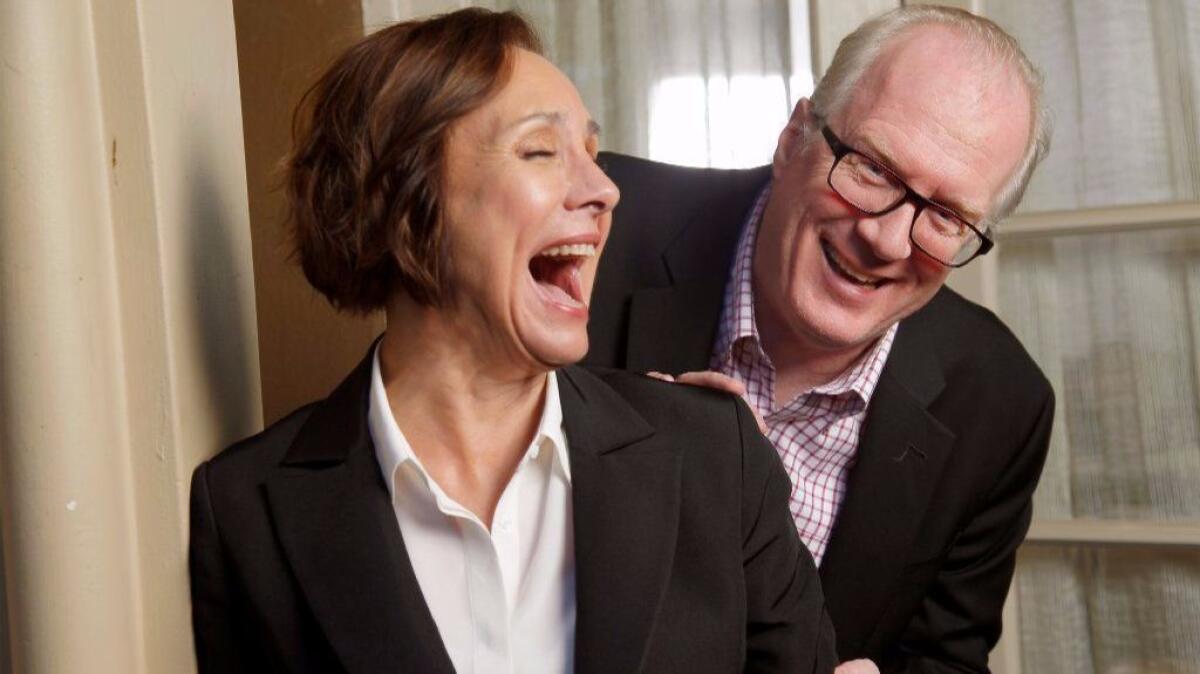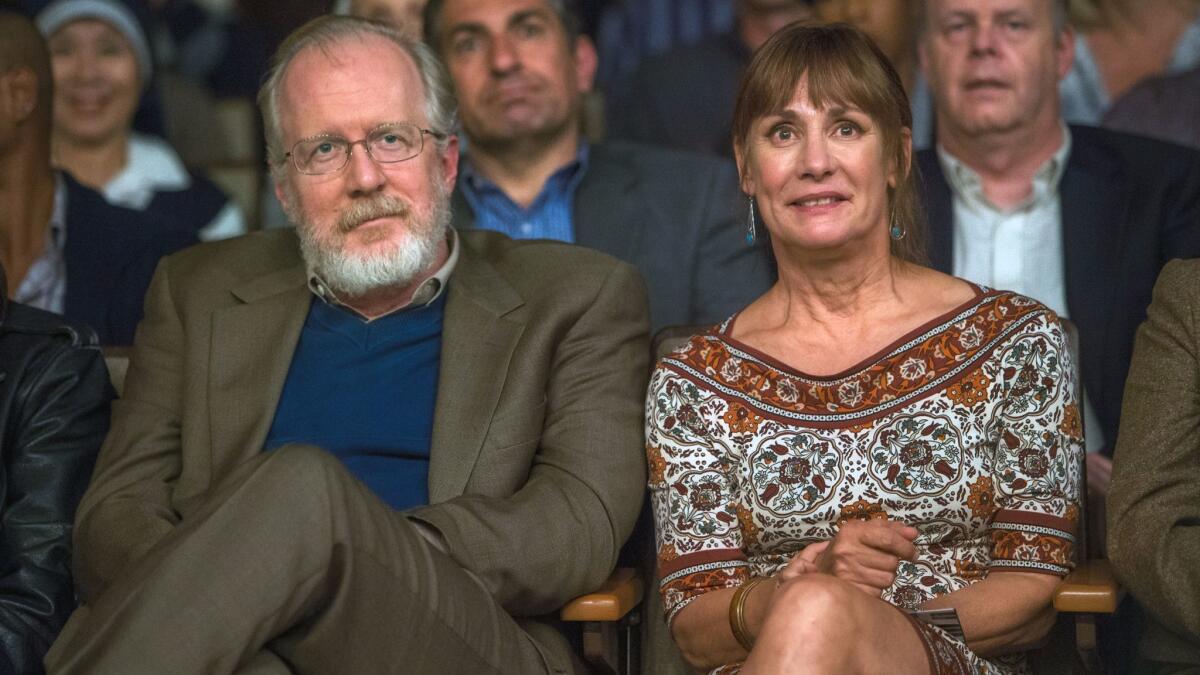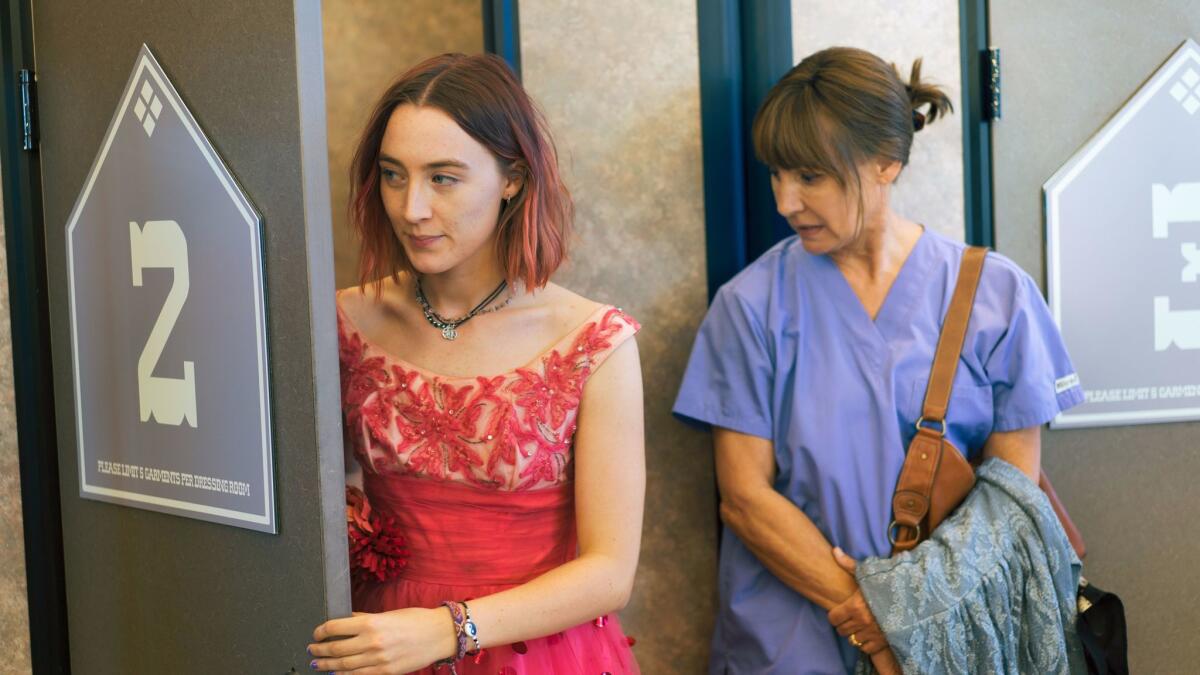Q&A: Theater veterans Tracy Letts and Laurie Metcalf on sharing the screen in Greta Gerwig’s ‘Lady Bird’

- Share via
Actress Laurie Metcalf and actor and playwright Tracy Letts have known each other for nearly 30 years. They grew up in small towns in the Midwest — Metcalf in Illinois, Letts in Oklahoma — and launched their careers at Chicago’s Steppenwolf Theatre Company, where they remain members to this day.
Yet surprisingly, the two have never actually worked together — until now.
“Nobody believes it but it’s true,” Letts said on a recent afternoon in Beverly Hills over lunch with Metcalf. “I did my first show at Steppenwolf in 1988 and that’s when I met Laurie. We were all terrified of her.” He laughed. “We’re still terrified of her!”
In writer-director
Both have earned raves for their performances, with Metcalf already popping up on Oscar prognosticators’ shortlists for a possible supporting actress nod.
Though Metcalf won three
For Gerwig, the prospect of bringing the two together on the big screen in her directorial debut was thrilling. “I’m a theater nerd, and the theater was my first love,” Gerwig said. “One of my favorite things about the movie is being able to shine a light on these people who are giants for me.”
Sharing the easy, joking rapport of longtime friends, Metcalf, 62, and Letts, 52, reflected on their new film, their careers and the craft they both love.

Do you think the fact that you two have known each other for so long gave you a leg up in creating this married couple?
Metcalf: Yeah, I think there was an easiness about it. It made it more comfortable. I had always wanted to work with Tracy because I love his acting style. I love how precise and minimalistic and direct it is. He becomes the rock in every scene.
Letts: There’s just a trust. Even though we hadn’t worked together before, we come from the same world. I’ve seen Laurie in a lot of plays and she’s seen me in a lot of plays and we’ve worked with a lot of the same people. So we speak the same language.
“Lady Bird” deals with themes we’ve seen in countless coming-of-age movies — friction with parents, alienation, yearning to be somewhere else — but somehow it manages to avoid falling into clichés. Was that something you guys discussed with Greta?
Metcalf: I remember her talking about how she wanted people in the cast who she could trust to play it sincerely but also find whatever humor might be in there. Otherwise, she just paid so much attention to detail that all of it naturally lent itself to having a slice-of-life feel. What the house looked like, what the clothes looked like, the music — she was in on every single detail.
Letts: I think that’s why directing sucks, because you have to worry about everything. You have to worry about [stuff] I don’t care about. And Greta does, clearly. She was collaborative but she always knew exactly what she wanted. Nothing about her felt like a first-time director. Nothing.
She doesn’t feel like someone who’s an actor-turned-director. She feels like someone who’s been paying a lot of attention to storytelling. I had seen “Frances Ha” and “Mistress America,” and when I read this screenplay, I heard her voice from those films immediately. She hasn’t just been acting in “Arthur” or whatever — she’s been paying attention to what she’s been doing. So I wasn’t surprised she had very precise direction.
The heart of this movie is the emotional push and pull between Lady Bird and her mother. Laurie, did you relate to that as a parent?
Metcalf: Playing this mom, I found myself realizing how bad it was when I would pull some passive-aggressive stuff on my own children — what kind of damage that can do, what kind of confidence that can strip from somebody. So I identified with that half of it. And the fighting half too. [laughs]
I remember months before we started shooting, Greta invited the five or six of us who were in New York over to her apartment. We read over our parts and afterwards she brought out a cardboard box of stuff she had saved during high school: journals, pictures, posters. Mentally it just kind of shifted things. I just felt like that character’s mom all of the sudden.

Letts: I don’t have any kids, so the one thing I felt I was going to have to work on was the father-daughter relationship. And then I met Saoirse and we just clicked from the beginning. I just felt very open and free with her, and she felt the same with me, I think.
A lot of it is intuitive. There’s not a lot of research or dramaturgy that goes into something like this. It’s just relationships: mothers and daughters, fathers and daughters, husbands and wives, friends. And if you’ve lived life in America, much of it is familiar to you.
Laurie, you’ve said you don’t feel completely in your element doing movies. Why is that?
Metcalf: I think it starts with a camera phobia I have. It makes me inhibited. Even having had years of Friday-night tape nights [on “Roseanne”], I never got used to it. Coming up in theater, I just feel like I know my way around that better.
Letts: I don’t know if you have this, Laurie — I don’t — but I know some Midwestern actors who have this feeling of, like, “I don’t deserve to be here making a movie.” Is that part of it?
Metcalf: Yeah. Maybe it comes from being from a small town, and a movie was a movie. It felt like we would never get there. But we could do community theater — and that’s where we should be.
Letts: It doesn’t make any sense to me. When we were making “Lady Bird,” I said, “Laurie, what’s the last movie you did before this?” And she couldn’t tell me. She probably still couldn’t tell you.
Metcalf: I can’t.
Letts: Does that make any sense? And she’s not sitting around turning down movie offers, which means there’s a lot of stupid people who should have been offering Laurie Metcalf jobs!
One could say the same thing about you — you’ve had a lot of great success in the theater, but it’s only fairly recently that you’ve started getting bigger roles in movies and on TV. Was that your ambition early in your career?
Letts: Yeah, I think it was. I was out here from 1997 to 2001. I think most young actors have a feeling that they’d like to do that kind of work. But it’s probably driven by vanity and all the wrong things. As you get older, you start to value the storytelling. You realize, “That’s what I do: I tell stories” — in my case, either as a writer or as an actor. You know, life changes you. Hopefully you get more accepting.
Metcalf: For me, the luxury of being able to bounce around between the three — theater, TV and movies — is crucial if you don’t want to burn out on any single one. It’s good to mix it up.
Letts: Yeah, I think there’s something to that. [Actress and director] Amy Morton refers to it as crop rotation. I think it’s good for the soil to keep mixing it up.
You’ve both won some major awards over the years. When your name is in the mix for that kind of thing, is it hard not to get caught up in it?
Metcalf: Well, you have, Tracy.
Letts: Um, you’ve won stuff too, my dear — recently. And how many … Emmys did you win?
I think it’s easier to get caught up in it on someone else’s behalf. When it’s directed at you, it’s just weird and off-putting. But it’s easy to cheer for someone else. I’m totally caught up in it for Laurie and Greta and Saoirse ... [to Metcalf] I mean, come on — you’re probably going to get an Academy Award nomination.
Metcalf: [laughs] Tracy!
Letts: Maybe I’m not supposed to say that but I think that’s in the cards. In fact, if I were a betting man — and I am — I’d put money on it.
Metcalf: It’s obviously to Greta’s credit that people are responding to the movie the way that they are and identifying with everybody in it the way that they are. Every single character in it is fully formed and three-dimensional and has a whiff of a back story. It’s so well crafted. She did a terrific job.
[shakes her head] A little independent movie set in Sacramento. Who’d have thought?
Only good movies
Get the Indie Focus newsletter, Mark Olsen's weekly guide to the world of cinema.
You may occasionally receive promotional content from the Los Angeles Times.








